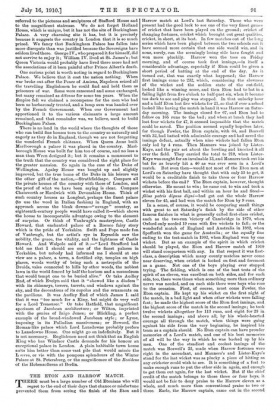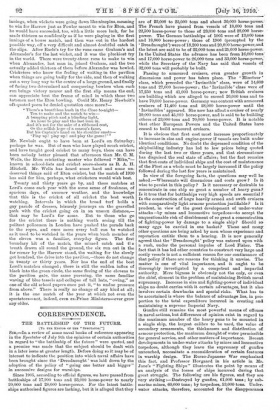THE ETON AND HARROW MATCH.
THERE must be a large number of Old Etonians who will regret to the end of their days that chance or misfortune prevented them from seeing the finish of the Eton and
Harrow match at Lord's last Saturday. Those who were present had the good luck to see one of the very finest games of cricket that have been played on the ground; cricket of changing fortunes, cricket which brought out great qualities, cricket, in short, at its best. In few matches out of the long series which have been played between the two schools can it have seemed more certain that one side would win, and in none, surely, can the seemingly losing side have fought and won more pluckily. Harrow won the toss on Friday morning, and of course took first innings,—in itself a considerable advantage, especially if Eton could be given a short period of batting at the end of the day. As it turned out, that was exactly what happened ; the Harrow first innings came to 232, which, considering the slowness of the wicket and the sodden state of the out-field, looked like a winning score, and then Eton had to bat in a failing light from five o'clock to half-past six, when it became too dark to see and play was stopped. In that unlucky hour and a half Eton lost five wickets for 21, so that if ever a school looked like having the match in hand it was Harrow on Satur- day morning. The innings closed for 67, and Eton had to follow on 165 runs to the bad; and when at lunch they had lost four wickets for 47, it seemed impossible that the match could be saved. The position seemed equally hopeless later, for though Fowler, the Eton captain, with 64, and Boswell with 32, had batted with admirable courage and had saved the innings defeat, actually when nine wickets had fallen Eton only led by 4 runs. Then Manners was joined by Lister- Kaye, and the pair set about the bowling and knocked it all over the field. They carried the total to 219, when Lister- Kaye was caught for an invaluable 13, and Manners took out his bat for as bravely hit a 40 as was ever seen in a Lord's match. But even then—would not most of the Eton men at Lord's on Saturday have thought that with only 55 to get, it would be a creditable finish to take three or four Harrow wickets before the end P The Eton captain, however, thought otherwise. He meant to win ; he came out to win and took a wicket with his first ball, and within an hour he and Steel— Pius patris dignus digni—had got out the whole Harrow eleven for 45, and had won the match for Eton by 9 runs.
In a sense, of course, it would be comparing small things with great to set Saturday's finish by the side of other famous finishes in what is generally called first-class cricket, such as the two-run 'victory of Cambridge in 1870, when Oxford only needed 19 runs with five wickets to fall ; or the wonderful match of England and Australia in 1882, when Spofforth won the game for Australia ; or the equally fine ending to the test-match in 1902, when England won by one wicket. But as an example of the spirit in which cricket should be played, the Eton and Harrow match of 1910 will stand comparison with any. In that respect it was first- class, a description which many county matches never come near deserving, when cricket is looked on first and foremost as a game. Not one of the boys playing ever stopped trying. The fielding, which is one of the best tests of the spirit of an eleven, was excellent on both sides, and for each side, too, there were times when something more than ordinary nerve was needed, and on each side there were boys who rose to the occasion. First, of course, must come Fowler, the Eton captain. He kept up his wicket on the first night of the match, in a bad light and when other wickets were falling fast ; he made the highest score of the Eton first innings, and the highest score of the match in the second innings ; he took twelve wickets altogether for 113 runs, and eight for 23 in the second innings ; and above all, by his whole-hearted courage all through the match, when things were going against his side from the very beginning, he inspired his team as a captain should. No Eton captain can have prouder memories of a Lord's match, and one of his best memories of all will be the way in which be was backed up by his men. One of the steadiest and coolest innings of the match was Boswell's 32, made when Harrow fortunes were right in the ascendant, and Manners's and Lister-Kaye's stand for the last wicket was as plucky a piece of hitting as any cricketer could wish to see. It is something of a feat to make enough runs to put the other side in again, and enough to get them out again, for the last wicket. But if the chief credit of the match belongs to these three or four boys, it would not be fair to deny praise to the Harrow eleven as a whole, and much more than conventional praise to two or three. Earle, the Harrow captain, came out in the second innings, whin wickets were going down like ninepins, meaning to win for Harrow just as Fowler meant to win for Eton, and
he would have succeeded, too, with a little more lack, for he made thirteen as confidently as if he were playing in the first innings of a house match, and then was out in the hardest possible way, off a very difficult and almost doubtful catch in
the slips. After Earle's try for the runs came Graham'a and Alexander's for the last wicket, and it was the pluckiest try in the world. There were twenty-three runs to make to Win when Alexander, last man in, joined Graham, and the two actually added thirteen of them before Alexander was bowled. Cricketers who know the feeling of waiting in the pavilion when things are going badly for the side, and then of walking out a very long way to the centre of a large ground, and finally of facing two determined and conquering bowlers when each run brings victory nearer and the first slip means the end, can appreciate best the frame of mind in which those two batsmen met the Eton bowling. Could Mr. Henry Newbolt's oft-quoted poem be denied quotation once more ft-
" There's a breathless hush in the Close to-night-
Ten to make and the match to win- A bumping pitch and a blinding light, An hour to play and the last man in.
And it's not for the sake of a ribboned coat, Or the selfish hope of a season's fame, But his Captain's hand on his shoulder smote- ' Play up ! play up ! and play the game !'"
Mr. Newbolt ought to have been at Lord's on Saturday ; perhaps he was. But of men who have played much cricket,
and have taught good cricket to many boys, there can have been nobody better pleased that afternoon than Mr. 0. M. Wells, the Eton cricketing master who followed " Mike,"- known in school-lists and cricket score-sheets as R. A. H. Mitchell. Mr. Wells has heard some hard and some un- deserved things said of Eton cricket, but the match of 1910 has said for him, perhaps, what cricketers would wish best.
Twenty and thirty years go by, and these matches at Lord's come each year with the same sense of freshness, of spacious days, of summer weather, and the knowledge that this is the cricket of all cricket the best worth watching. Intervals in which the broad turf holds a gay parade of dresses, leisurely journeys on the gravelled path with the cricket going on in an unseen distance,-.. that may be Lord's for some. But to those who go for the cricket there is nothing worth seeing till the politest policemen in London have pushed the parade back to the ropes, and once more every ball can be watched as it used to be watched in the years when ;each member of the eleven was a familiar, everyday figure. The first boundary hit of the match, the missed catch and ti e breath drawn all round the ground, the six run out in the far corner by the Harrow stand, the waiting for the slowly got hundred, the drive into the pavilion,-those do not change
in twenty or thirty years. Nor has the end of the best Lord's matches changed ; there is still the sudden influx of black into the green circle, the same fleeing of the elevens to the pavilion gate, the same pursuing, the same familiar
waving of blue tassels and collapse of tall hats, " owing," as one of the old school papers once put it, " to undue pressure from above." There is really no change of any kind at all; it is the one match of the year at which not even the spectators-not, indeed, even ex-Prime Ministers-ever grow any older.







































 Previous page
Previous page